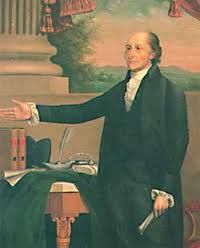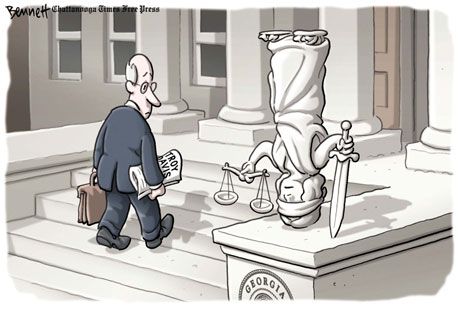“Punting the Pundits” is an Open Thread. It is a selection of editorials and opinions from around the news medium and the internet blogs. The intent is to provide a forum for your reactions and opinions, not just to the opinions presented, but to what ever you find important.
Thanks to ek hornbeck, click on the link and you can access all the past “Punting the Pundits”.
The Sunday Talking Heads:
This Week with Christiane Amanpour: This week White House advisor David Plouffe will discuss the president’s job plan.
George Will, former Obama economic adviser and University of Chicago professor Austan Goolsbee, top investment manager PIMCO CEO Mohamed El-Erian, and Chrystia Freeland of Thompson Reuters debate whether the world is on the cusp of a double-dip recession.
Republican strategist Mary Matalin, Democratic strategist Donna Brazile and ABC News Political Director Amy Walter join George Will to debate which GOP candidate came out on top and whether any of them has what it takes to challenge President Obama.
Face the Nation with Bob Schieffer: This Sunday DNC Chair Debbie Wasserman Schultz and
RNC Chair Reince Priebus join Bob to debate the state of the Obama presidency and the economy.
The Chris Matthews Show: This week’s guests Helene Cooper, The New York Times White House Correspondent, Andrew Sullivan, The Daily Beast Editor, The Dish,
Gloria Borger, CNN Senior Political Analyst and Michael Gerson, The Washington Post Columnist will discuss:Obama wants to repeal the Bush era tax cuts for those making more than $250K
Is Perry losing steam? Was Thursday’s debate a turning point for Romney?
Meet the Press with David Gregory: Israel’s Prime Minister Benjamin Netanyahu and NYC MAyor Michael Bloombreg are guests.
Former Secretary of Education, William Bennett; former Secretary of Health and Human Services and current president of the University of Miami, Donna Shalala; PBS’s Tavis Smiley; and the CEO of the Special Olympics, Tim Shriver will discuss eduation.
State of the Union with Candy Crowley: White House senior adviser, David Plouffe is making the morning rounds.
Democratic Sen. Mark Warner (D-VA) and Republican Sen. Lamar Alexander ()R-TN) will discuss the latest funding hostage situation.
Indiana’s Republican Governor Mitch Daniels will discuss the Republican 2012 field of candidates.
USA Today’s Washington bureau chief Susan Page and TIME Magazine’s deputy bureau chief, Michael Crowley will join the conversation about the latest poll that shows a majority of Americans blame President Obama for the country’s teetering economy.
I have been saying this for years upon years, but it bears repeating: the most awesome, fearsome, and effective weapon in the arsenal of the modern Republican Party is their total, utter and complete lack of shame.
That weapon – the ability to say or do anything, literally anything, even as it flies in the face of on-the-record comments made just the day before, or contradicts thousands of votes cast in congresses past – is the equivalent of a battlefield-deployed tactical nuclear weapon. It clears the field, but good, and if everything is ashes in the aftermath, so be it. So long as effective spin makes the news cycle, it’s a victory for them, and screw the people who get hurt.
Rachel Lewis: Wall Street Vampires
Vampires. Thieves of the night. As sunlight is said to be deadly to them, these mythical creatures venture out to drain the blood from their innocent victims only when it is dark outside. Judging by the reactions of Wall Street to Public Citizen’s attempt to shine a light on their industry, it seems sunlight kills more than vampires though. Lady Liberty can’t help but wonder if the Goldman Sachs, J.P. Morgan et al crew are trying to audition for the next season of True Blood . . . or, more likely, they have something to hide.
Remember that big gas price spike back in 2008? Well, Tyson Slocum, director of Public Citizen’s Energy Program, didn’t buy the reasons offered for it then, and he didn’t buy it this spring either when he spoke with then-MSNBC’s Cenk Uygur for a segment properly entitled, “Rigged Game.” Uygur’s first question, “Is it possible that speculators are driving up the gas prices?” Slocum’s reply-“Absolutely.” At the time President Barack Obama, responding to the media frenzy over gas prices, announced the formation of a task force to look into what was driving the increase. Slocum explained to me that this was many months ago and so far, “not a peep” has been heard from this investigative team.
Dave johnston: Conservatives Say It Out Loud: They Hate Democracy
The roots of today’s toxic conservative movement lie in Ayn Rand’s teaching that wealthy “producers” — now called “job creators” — should be left alone by the government, namely the rest of us. The rest of us are “freeloaders,” “moochers,” “leeches” and “parasites” who feed off these producers and who shouldn’t be allowed to make decisions to collect taxes from them or regulate them or interfere in most other ways. The Randians hate democracy, and say so, declaring that “collectivism” sacrifices individual rights to majority wishes.
Maureen Dowd: Fed Up With the Author of ‘Fed Up!’?
IN a flash, Rick Perry has gone from Republican front-runner to cycling domestique, riding in front of the pack and taking all the wind – or in this case, hot air – to allow the team leader to pedal in the slipstream.
In the debate on Thursday night in Florida, as Perry grew more Pinteresque, lapsing into long, paralyzed pauses, Mitt Romney grew less statuesque, breaking his marble mold and showing a new sarcastic streak.

 Welcome to the Stars Hollow Health and Fitness weekly diary. It will publish on Saturday afternoon and be open for discussion about health related issues including diet, exercise, health and health care issues, as well as, tips on what you can do when there is a medical emergency. Also an opportunity to share and exchange your favorite healthy recipes.
Welcome to the Stars Hollow Health and Fitness weekly diary. It will publish on Saturday afternoon and be open for discussion about health related issues including diet, exercise, health and health care issues, as well as, tips on what you can do when there is a medical emergency. Also an opportunity to share and exchange your favorite healthy recipes. 

 Eugene Robinson:
Eugene Robinson:  . . . . Andre Malraux, the French minister of culture, commissioned him to design a new ceiling for the Paris Opera after seeing Chagall’s work in Daphnis et Chloe. Working with a surface of 560 square meters, Chagall divided the ceiling into color zones that he filled with landscapes and figures representing the luminaries of opera and ballet. The ceiling was unveiled on September 23, 1964, during a performance of the same Daphnis et Chloe. As usual, a few detractors condemned Chagall’s work as overly primitive, but this criticism was drowned out in the general acclaim for the work. In 1966, as a gift to the city that had sheltered him during World War II, he painted two vast murals for New York’s Metropolitan Opera House (1966).
. . . . Andre Malraux, the French minister of culture, commissioned him to design a new ceiling for the Paris Opera after seeing Chagall’s work in Daphnis et Chloe. Working with a surface of 560 square meters, Chagall divided the ceiling into color zones that he filled with landscapes and figures representing the luminaries of opera and ballet. The ceiling was unveiled on September 23, 1964, during a performance of the same Daphnis et Chloe. As usual, a few detractors condemned Chagall’s work as overly primitive, but this criticism was drowned out in the general acclaim for the work. In 1966, as a gift to the city that had sheltered him during World War II, he painted two vast murals for New York’s Metropolitan Opera House (1966). When the Civil War broke out in 1861, shortly after Lincoln’s inauguration as America’s 16th president, he maintained that the war was about restoring the Union and not about slavery. He avoided issuing an anti-slavery proclamation immediately, despite the urgings of abolitionists and radical Republicans, as well as his personal belief that slavery was morally repugnant. Instead, Lincoln chose to move cautiously until he could gain wide support from the public for such a measure.
When the Civil War broke out in 1861, shortly after Lincoln’s inauguration as America’s 16th president, he maintained that the war was about restoring the Union and not about slavery. He avoided issuing an anti-slavery proclamation immediately, despite the urgings of abolitionists and radical Republicans, as well as his personal belief that slavery was morally repugnant. Instead, Lincoln chose to move cautiously until he could gain wide support from the public for such a measure.
Recent Comments